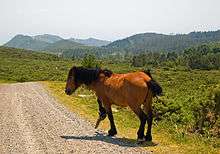pexa
Galician

A wild horse in the mountains of Galicia, illegally fettered with a péga or pexa

Idem
Etymology
From an older *peja, from Vulgar Latin *pedea, from Latin pedem (“foot”). Cognate with Portuguese peia.
Pronunciation
- IPA(key): /ˈpeʃa̝/
Noun
pexa f (plural pexas)
Derived terms
- despexar
- despexo
- pexadoiro
- pexar
References
- “pexa” in Xavier Varela Barreiro & Xavier Gómez Guinovart: Corpus Xelmírez - Corpus lingüístico da Galicia medieval. SLI / Grupo TALG / ILG, 2006-2016.
- “pexa” in Dicionario de Dicionarios da lingua galega, SLI - ILGA 2006-2013.
- “pexa” in Tesouro informatizado da lingua galega. Santiago: ILG.
- “pexa” in Álvarez, Rosario (coord.): Tesouro do léxico patrimonial galego e portugués, Santiago de Compostela: Instituto da Lingua Galega.
Icelandic
Pronunciation
- IPA(key): /ˈpʰɛxsa/
- Rhymes: -ɛxsa
Verb
pexa (weak verb, third-person singular past indicative pexaði, supine pexað)
Conjugation
pexa — active voice (germynd)
| infinitive (nafnháttur) |
að pexa | ||||
|---|---|---|---|---|---|
| supine (sagnbót) |
pexað | ||||
| present participle (lýsingarháttur nútíðar) |
pexandi | ||||
| indicative (framsöguháttur) |
subjunctive (viðtengingarháttur) | ||||
| present (nútíð) |
ég pexa | við pexum | present (nútíð) |
ég pexi | við pexum |
| þú pexar | þið pexið | þú pexir | þið pexið | ||
| hann, hún, það pexar | þeir, þær, þau pexa | hann, hún, það pexi | þeir, þær, þau pexi | ||
| past (þátíð) |
ég pexaði | við pexuðum | past (þátíð) |
ég pexaði | við pexuðum |
| þú pexaðir | þið pexuðuð | þú pexaðir | þið pexuðuð | ||
| hann, hún, það pexaði | þeir, þær, þau pexuðu | hann, hún, það pexaði | þeir, þær, þau pexuðu | ||
| imperative (boðháttur) |
pexa (þú) | pexið (þið) | |||
| Forms with appended personal pronoun | |||||
| pexaðu | pexiði * | ||||
| * Spoken form, usually not written; in writing, the unappended plural form (optionally followed by the full pronoun) is preferred. | |||||
pexast — mediopassive voice (miðmynd)
| infinitive (nafnháttur) |
að pexast | ||||
|---|---|---|---|---|---|
| supine (sagnbót) |
pexast | ||||
| present participle (lýsingarháttur nútíðar) |
pexandist ** ** the mediopassive present participle is extremely rare and normally not used; it is never used attributively or predicatively, only for explicatory subclauses | ||||
| indicative (framsöguháttur) |
subjunctive (viðtengingarháttur) | ||||
| present (nútíð) |
ég pexast | við pexumst | present (nútíð) |
ég pexist | við pexumst |
| þú pexast | þið pexist | þú pexist | þið pexist | ||
| hann, hún, það pexast | þeir, þær, þau pexast | hann, hún, það pexist | þeir, þær, þau pexist | ||
| past (þátíð) |
ég pexaðist | við pexuðumst | past (þátíð) |
ég pexaðist | við pexuðumst |
| þú pexaðist | þið pexuðust | þú pexaðist | þið pexuðust | ||
| hann, hún, það pexaðist | þeir, þær, þau pexuðust | hann, hún, það pexaðist | þeir, þær, þau pexuðust | ||
| imperative (boðháttur) |
pexast (þú) | pexist (þið) | |||
| Forms with appended personal pronoun | |||||
| pexastu | pexisti * | ||||
| * Spoken form, usually not written; in writing, the unappended plural form (optionally followed by the full pronoun) is preferred. | |||||
pexaður — past participle (lýsingarháttur þátíðar)
| strong declension (sterk beyging) |
singular (eintala) | plural (fleirtala) | |||||
|---|---|---|---|---|---|---|---|
| masculine (karlkyn) |
feminine (kvenkyn) |
neuter (hvorugkyn) |
masculine (karlkyn) |
feminine (kvenkyn) |
neuter (hvorugkyn) | ||
| nominative (nefnifall) |
pexaður | pexuð | pexað | pexaðir | pexaðar | pexuð | |
| accusative (þolfall) |
pexaðan | pexaða | pexað | pexaða | pexaðar | pexuð | |
| dative (þágufall) |
pexuðum | pexaðri | pexuðu | pexuðum | pexuðum | pexuðum | |
| genitive (eignarfall) |
pexaðs | pexaðrar | pexaðs | pexaðra | pexaðra | pexaðra | |
| weak declension (veik beyging) |
singular (eintala) | plural (fleirtala) | |||||
| masculine (karlkyn) |
feminine (kvenkyn) |
neuter (hvorugkyn) |
masculine (karlkyn) |
feminine (kvenkyn) |
neuter (hvorugkyn) | ||
| nominative (nefnifall) |
pexaði | pexaða | pexaða | pexuðu | pexuðu | pexuðu | |
| accusative (þolfall) |
pexaða | pexuðu | pexaða | pexuðu | pexuðu | pexuðu | |
| dative (þágufall) |
pexaða | pexuðu | pexaða | pexuðu | pexuðu | pexuðu | |
| genitive (eignarfall) |
pexaða | pexuðu | pexaða | pexuðu | pexuðu | pexuðu | |
Latin
Participle
pexa
- nominative feminine singular of pexus
- nominative neuter plural of pexus
- accusative neuter plural of pexus
- vocative feminine singular of pexus
- vocative neuter plural of pexus
pexā
- ablative feminine singular of pexus
References
- pexa in Charles du Fresne du Cange’s Glossarium Mediæ et Infimæ Latinitatis (augmented edition, 1883–1887)
This article is issued from
Wiktionary.
The text is licensed under Creative
Commons - Attribution - Sharealike.
Additional terms may apply for the media files.